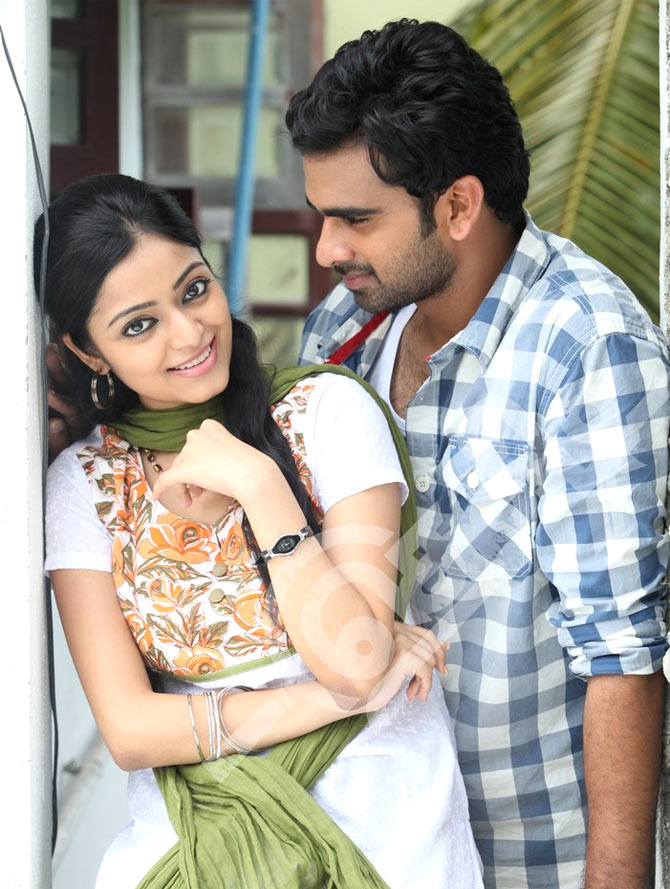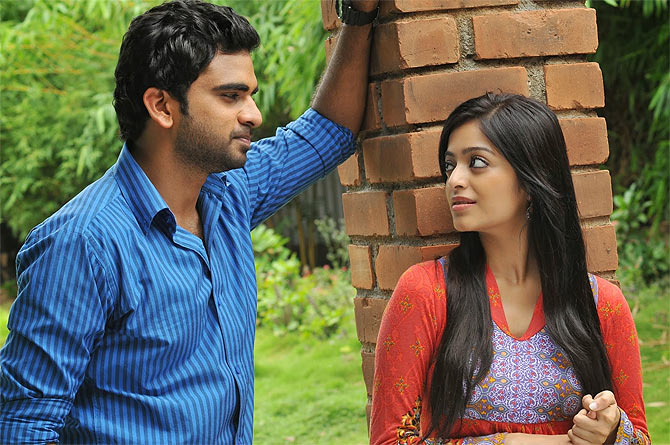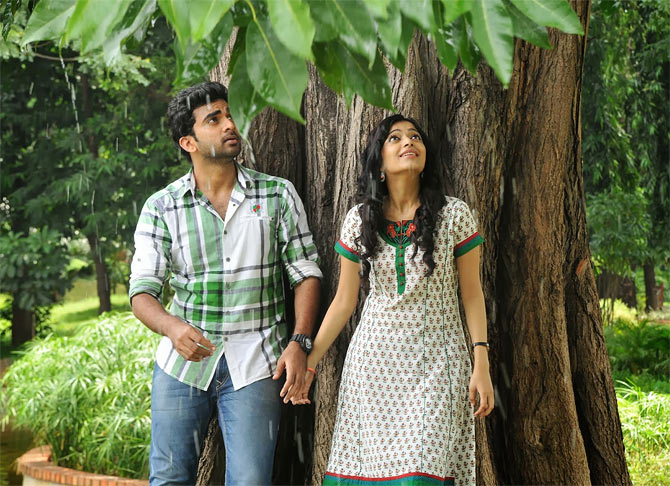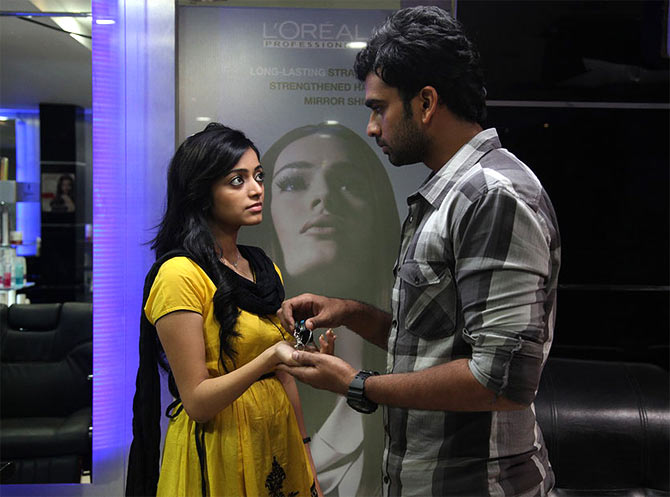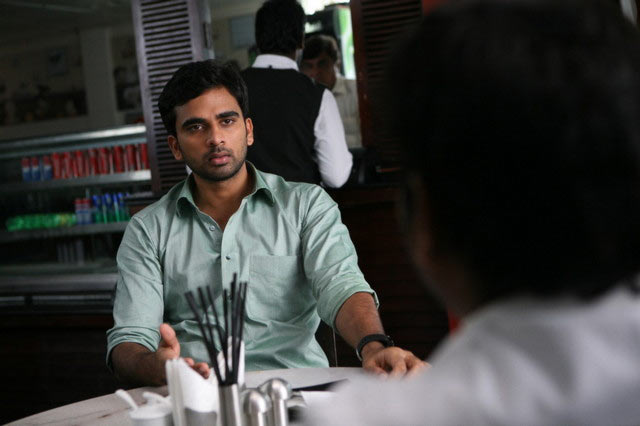 | « Back to article | Print this article |
'There are no immediate plans to make Thegidi 2'
Over the last one year, several short-film makers have made successful mainstream films: Nalan Kumarasamy (Soodhu Kavvum) and Karthik Subbaraj (Pizza) among them.
Most recent is director P Ramesh, whose film Thegidi, an investigative thriller, has opened to positive reviews.
Brilliantly directed, enhanced by the sensational music of newcomer Nivas K Prasanna, cinematography by Dinesh Krishnan and a great performance by actor Ashok Selvan, the film is a total entertainer.
P Ramesh first came to public attention when he entered seven of his short films for a TV reality show, and won the title.
In this interview, Ramesh talks about his unfulfilled desire to work as an assistant director, the show that provided the platform for his subsequent success in the world of cinema, and what the making of his first feature film has taught him.
First the music went viral and now the film has got great reviews. How does it feel?
We had an overwhelming response for the music and did expect a positive response for the film too.
But the response has exceeded all our expectations. People love the film. I feel very happy.
'I always had the desire to get into the world of cinema'
How did your producers Thirukumaran Entertainment, ABI TCS Studios and Vel Media come on board?
I first approached C V Kumar of Thirukumaran Entertainment with my script. He was quite impressed and felt that it had potential.
He suggested that we do the film in association with Vel Media and ABI TCS. He had worked with ABI TCS in Kalyana Samayal Saadham, and Senthil Kumar of Vel Media is his brother.
C V Kumar appears to be the messiah of newcomers.
It was my perception that he gives a lot importance to the script. He reads and analyses every script to understand its potential.
Only when he is personally convinced and confident about it, will he take it to the next level. So, if a newcomer approaches him with a great script, he will not hesitate to give him the opportunity.
How has the TV reality show Naalaya Iyakunar contributed to your success?
Before Naalaya Iyakunar I did not have much experience in film making. I had actually completed my master's degree in Computer Application and was working in the IT industry. But I always had the desire to get into the world of cinema.
The show provided the right platform. It gave me a certain recognition that helped make this dream a possibility.
I had to make seven short films. There were several rules and time constraints. That taught me discipline. You had to learn how to form a team quickly and work together within a time frame.
Winning the title was a huge bonus. I got the recognition I was yearning for, and it helped people realise that I had talent.
I learnt a lot. But I feel this is not comparable to the experience you can gain working as an assistant director. That is when you understand the whole process.
It has been my greatest desire to work under someone. I had submitted my resume to most directors of repute, but sadly, I did not get the opportunity.
'There is a huge difference between making short films and a full length feature film'
Why do you think working, as an assistant director is so important when you had already made seven short films?
There is a huge difference between making short films and a full length feature film. I believe that it is very important to work as an assistant director if not for the entire film, then at least for a week.
This is the only way to gain personal experience and absorb all the finer nuances of filmmaking.
Though short films teach you editing, music and cinematography, there are other elements you need to know about, especially the significance of the Art Department and working with lyric writers.
There are so many details that have to be learnt, but the most important thing is to first understand and gain knowledge about the basic elements involved in filmmaking.
Why did you choose to make an investigative thriller?
In all the short films that I made, the crime element was easily identifiable.
When trying to understand my strengths, I realised that crime was an important part of my script and seemed to work well for me.
I also believed that since something of this genre has not been attempted of late, it will be fresh and people will enjoy it.
Did you fear that it might not work?
How you narrate a story makes all the difference. An interesting and refreshing perspective will always appeal to people.
'It was not a deliberate attempt to work with the entire team of Soodhu Kavvum'
Has the trend changed now? Are people more willing to accept off-beat films?
I would not say it is a new trend. Many new concepts have been introduced earlier and people have always welcomed them.
However, what we have seen recently is the emergence of successful short-film makers. As a short-film maker myself, I wanted to say something new and tell it in an interesting manner.
I had the opportunity to project the same idea on the big screen. I did not want to compromise on the essence of my belief.
Short-film makers tend to keep away from so-called format. But I believe that if it is interesting, then people will encourage it.
Did you specifically want to work with technicians of the Soodhu Kavvum team? Even Ashok Selvan was part of Soodhu Kavvum
I was quite particular about Dinesh Krishnan, the cinematographer of Soodhu Kavvum. His work was very impressive.
Leo John Paul has been doing a great job and I needed their kind of work for my film too.
But this was not a deliberate attempt to work with the entire team of Soodhu Kavvum. My music director Nivas Prasanna is a newcomer.
What about Ashok Selvan?
I wanted someone young and energetic. My hero Vetri appears in every frame and had to shoulder a huge responsibility.
I wanted someone with lots of passion. I spoke to my friends, Deepan Chakravarthy (director of Pizza 2-Villa) and Nalan Kumarasamy and both assured me of Ashok's dedication.
Also I liked the fact that on hearing the story, Ashok was very enthusiastic about the character. There is a huge difference between just committing yourself to a project and actually feeling a kinship with the character. Being passionate about the story and character is very important for me.
'Thegidi was undoubtedly a huge learning experience for me'
Tell us about your music director Nivas Prasanna.
I was very impressed with Nivas right from the beginning. We bonded very well and I knew he would do full justice to the story.
Music plays a very important role in the film. When I heard the songs I knew that I had made the right choice.
What is the most valuable lesson you have learnt from the making of Thegidi?
Thegidi was undoubtedly a huge learning experience for me. I understood the importance and need of working together as a team. All the departments have to be in sync with each other.
In my next film, I want everyone involved to be part of the entire process and understand not only their role, but the film as a whole.
Besides, in retrospect, I also feel that I need to work a little more on the romance and humour elements of the film.
I had to make compromises due to time constraints, which will have to be managed better in my next film.
The end suggested a sequel in the offing. Are you working on Thegidi-2?
Many people have been asking that question. But, no, there are no immediate plans to make a sequel.
It will be an interesting and challenging project, but I don't want to make another film in a similar genre, at least for now.
I have several new ideas, but I wanted to wait until the release of the film to make a decision.
